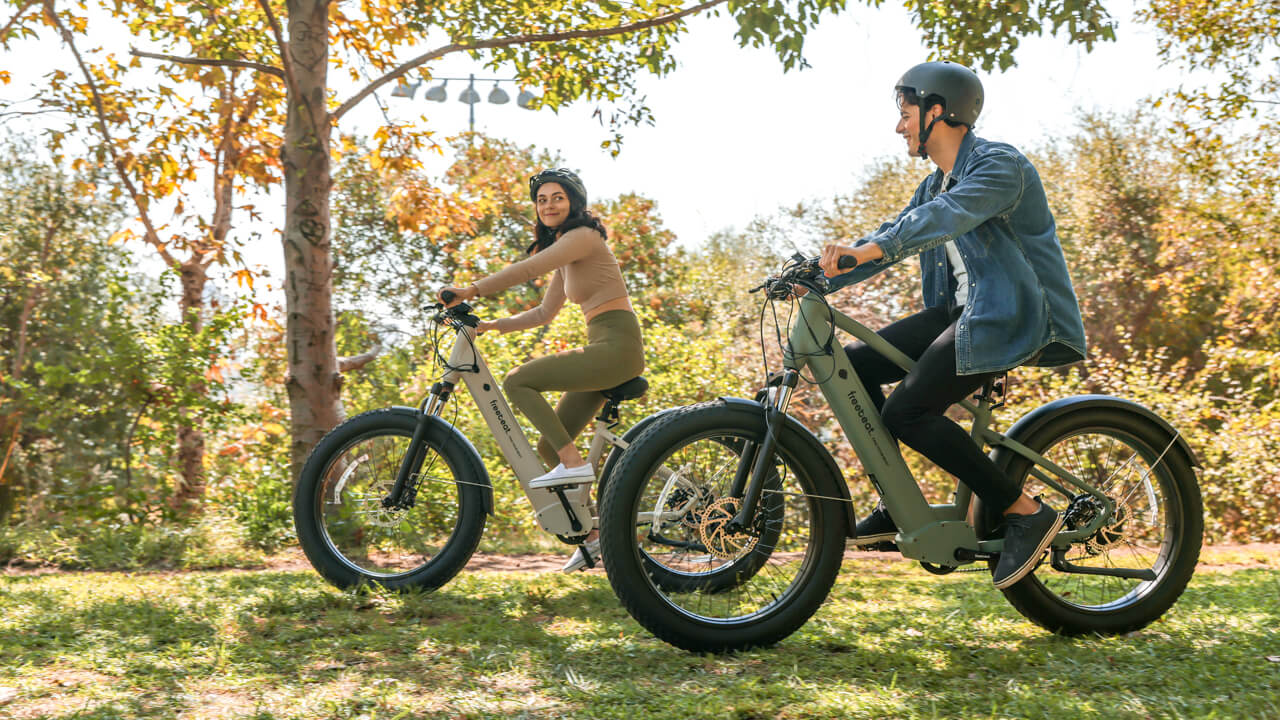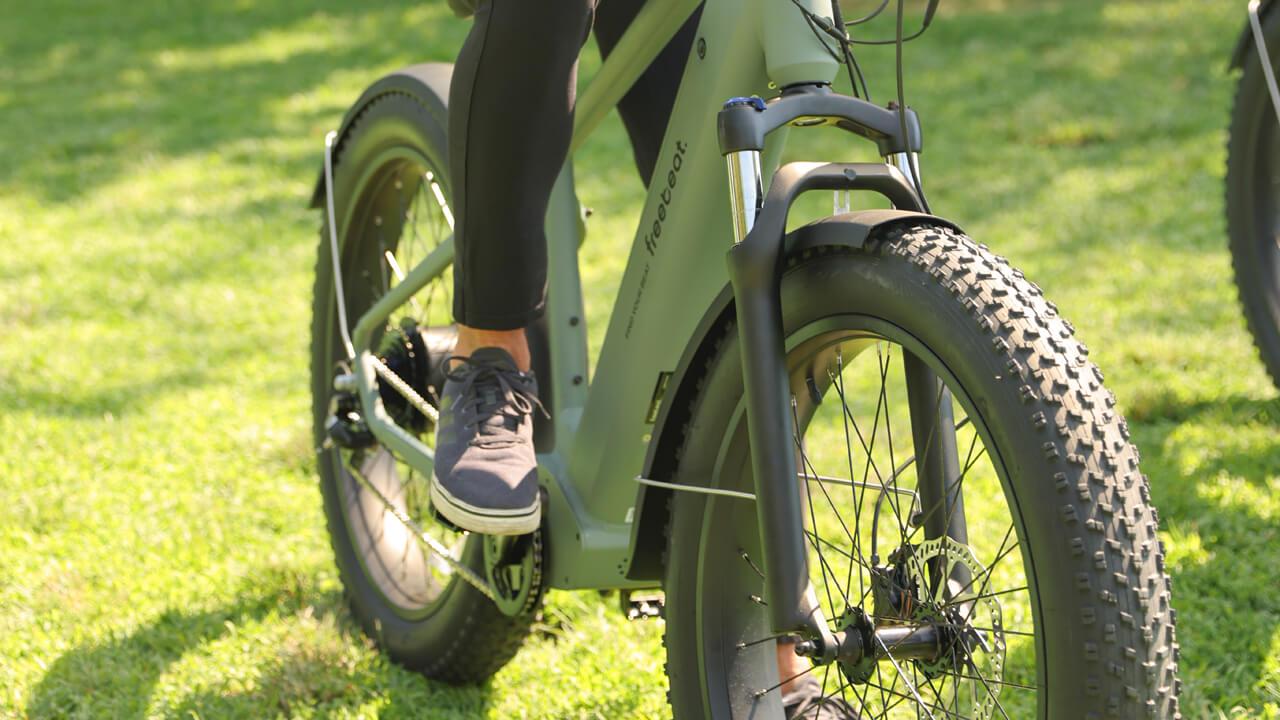Hybrid Bikes vs. Mountain Bikes: A Cyclist's Guide to Choosing Right
For cycling enthusiasts, choosing the right bike can be akin to an artist selecting their brush or a runner picking out their shoes. The decision to ride a hybrid or a mountain bike is central to the biking experience, affecting everything from the type of trails you tackle to the comfort level of your ride. Whether you are navigating a cityscape or exploring rugged mountain terrain, the bike beneath you becomes a part of your identity on two wheels.
Among the plethora of options, hybrid bikes and mountain bikes stand out as two of the most versatile choices. But which one is right for you? In this comprehensive comparison, we'll dissect the distinctive features of hybrid and mountain bikes, helping cycling enthusiasts like yourself make an informed decision.
The Hybrid Bike: A Jack of All Trades
Hybrid Bike Frame

Hybrid Bike Tires
Hybrid Bike Gearing
Hybrid Bike Suspension
Hybrid Bike: Pros and Cons
Pros
-
Versatile: Hybrid bikes are suitable for a wide range of terrain and riding styles, making them a great all-purpose option.
-
Comfortable: With an upright riding position, hybrid bikes offer a more comfortable and relaxed experience than road or mountain bikes.
-
Lightweight: Due to their design focus on speed and efficiency, hybrid bikes tend to be lighter in weight compared to mountain bikes.
-
Affordable: Hybrid bikes often come at a lower price point than mountain bikes, making them a budget-friendly option for beginners or casual cyclists.
Cons
-
Limited capabilities: While hybrid bikes can handle a variety of terrains, they may not be suitable for extreme or technical trails like those designed specifically for mountain biking.
-
Less efficient on the road: The wider tires and upright riding position can make hybrid bikes less efficient on paved roads compared to road bikes.
-
Lack of suspension: While some hybrid bike models do include front suspension, it may not be enough for more challenging off-road trails.
The Mountain Bikes: Tackling the Tough Stuff
MTB Frame Design
MTB Tires

MTB Gearing
MTB Suspension
Mountain Bike: Pros and Cons
Pros
-
Off-road capabilities: Mountain bikes are specifically designed for off-road riding, making them a top choice for adventurous and challenging terrain.
-
Superior traction: The wider tires and treads on mountain bikes provide excellent grip and control on loose or rough surfaces.
-
Shock absorption: With full suspension or front suspension, mountain bikes offer a smoother ride over uneven terrain, reducing the risk of injury and fatigue.

Cons
-
Expensive: High-end mountain bikes can come at a steep price, making them a more significant investment compared to hybrid or road bikes.
-
Heavier than other types of bikes: Due to their sturdy construction and added features like suspension, mountain bikes tend to be heavier and slower on paved roads compared to hybrid or road bikes.
-
Limited versatility: While mountain bikes excel in off-road riding, they may not be as suitable for city commuting or casual rides on paved paths.
Hybrid Bike vs. Mountain Bike: Deciphering the Differences
Intended Use
-
Hybrid bikes are designed for the everyday rider who may encounter a variety of terrains, from smooth city streets to gravel paths.
-
Mountain bikes are intended for aggressive off-road use, with features tailored to tackle challenging trails, such as steeper climbs and descents.
Speed and Efficiency
-
Hybrid bikes offer a middle ground in terms of speed and efficiency. They may not match the lightweight and streamlined design of road bikes, but their generous gear range and overall functionality make them faster than mountain bikes on flat or paved surfaces.
-
Mountain bikes prioritize traction and control over outright speed. They perform admirably on rough terrain but might feel sluggish on roads or more even trails, mainly due to their heavier weight and substantial tire tread.
Comfort
-
Hybrid bikes excel in comfort, with a more upright riding position that is less taxing on the back and neck. Front suspension options also contribute to a smoother ride, especially on urban streets with occasional potholes.
-
Mountain bikes, especially those with full suspension, are incredibly comfortable on rough trails, with the suspension system dramatically reducing the impact on the body.
Summary: hybrid bike vs. mountain bike
-
Do you plan to ride predominantly on paved roads or dirt trails?
-
Are you looking for a bike to use as a commuter, a fitness tool, a leisurely cruiser, or a hardcore trail rider?
-
What are the typical conditions of the trails or roads in your area?

When to Choose a Hybrid Over a Mountain Bike
When a Mountain Bike Should Be Your Choice
On the flip side, the mountain bike's design elements come into play when the trail gets rough. Where hybrids might falter, mountain bikes excel. If you're into off-road cycling, trail riding, or mountain biking, the specialized features of an MTB ensure a safer, more thrilling experience. Even if the majority of your riding is done in a city, but you plan to regularly venture off-road, the stability and control provided by a mountain bike might be worth the trade-off in speed and agility.
The never-ending debate of hybrid bikes versus mountain bikes ultimately comes down to utility and preference. A hybrid bike could be your best friend in the city, offering a comfortable and versatile ride, while a mountain bike will be a reliable companion on the roughest trails. Both have their charms and cater to different cycling needs. It's important to identify your requirements and intended usage to ensure you get the most out of your two-wheeled investment.
In the end, it's not about which bike is objectively 'better,' but which bike is better suited to you and the riding you love to do. Take the time to test ride different models, ask for advice from fellow cyclists, and perhaps consult with a professional to find the perfect fit for your cycling escapades. Whether you're heading downtown or up a mountainside, the right bike is waiting to take you on the adventure of a lifetime.
















